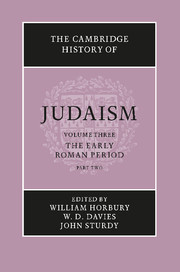Book contents
- Frontmatter
- 1 The archaeology of Palestine 63 bce–ce 70
- 2 The Herodian Temple
- 3 Recent archaeology in Palestine: achievements and future goals
- 4 The contribution of Jewish inscriptions to the study of Judaism
- 5 The social, economic and political history of Palestine 63 bce–ce 70
- 6 The Diaspora in the Roman period before ce 70
- 7 The Gentiles in Judaism 125 bce–ce 66
- 8 Gentiles as seen by Jews after ce 70
- 9 The synagogue
- 10 The Temple and the synagogue
- 11 The early liturgy of the synagogue
- 12 Women in the synagogue
- 13 The Pharisees
- 14 The Sadducees – their history and doctrines
- 15 The Essenes
- 16 The baptist sects
- 17 The troublemakers
- 18 The Samaritans and their sects
- 19 Galilean Judaism and Judaean Judaism
- 20 Jesus: from the Jewish point of view
- 21 Paul: from the Jewish point of view
- 22 Jewish Christianity
- 23 Apocalyptic: the disclosure of heavenly knowledge
- 24 The Qumran sectarian writings
- 25 The Dead Sea Scrolls and pre-Tannaitic Judaism
- 26 Prayer in the Qumran Texts
- 27 Philo of Alexandria
- 28 Josephus (ce 37–c. 100)
- 29 The rabbi in second-century Jewish society
- 30 The Hellenistic–Roman Diaspora ce 70–ce 235: the archaeological evidence
- 31 The legacy of Egypt in Judaism
- 32 Jewish elements in gnosticism and magic c.ce 70–c.ce 270
- Bibliographies
- Index
- References
22 - Jewish Christianity
Published online by Cambridge University Press: 28 March 2008
- Frontmatter
- 1 The archaeology of Palestine 63 bce–ce 70
- 2 The Herodian Temple
- 3 Recent archaeology in Palestine: achievements and future goals
- 4 The contribution of Jewish inscriptions to the study of Judaism
- 5 The social, economic and political history of Palestine 63 bce–ce 70
- 6 The Diaspora in the Roman period before ce 70
- 7 The Gentiles in Judaism 125 bce–ce 66
- 8 Gentiles as seen by Jews after ce 70
- 9 The synagogue
- 10 The Temple and the synagogue
- 11 The early liturgy of the synagogue
- 12 Women in the synagogue
- 13 The Pharisees
- 14 The Sadducees – their history and doctrines
- 15 The Essenes
- 16 The baptist sects
- 17 The troublemakers
- 18 The Samaritans and their sects
- 19 Galilean Judaism and Judaean Judaism
- 20 Jesus: from the Jewish point of view
- 21 Paul: from the Jewish point of view
- 22 Jewish Christianity
- 23 Apocalyptic: the disclosure of heavenly knowledge
- 24 The Qumran sectarian writings
- 25 The Dead Sea Scrolls and pre-Tannaitic Judaism
- 26 Prayer in the Qumran Texts
- 27 Philo of Alexandria
- 28 Josephus (ce 37–c. 100)
- 29 The rabbi in second-century Jewish society
- 30 The Hellenistic–Roman Diaspora ce 70–ce 235: the archaeological evidence
- 31 The legacy of Egypt in Judaism
- 32 Jewish elements in gnosticism and magic c.ce 70–c.ce 270
- Bibliographies
- Index
- References
Summary
INTRODUCTION TO THE PROBLEM
The term ‘Jewish Christianity’, in German ‘Judenchristentum’, was current in the eighteenth century, but was brought to prominence by Ferdinand Christian Baur. He used it to describe what he took to be an important phenomenon within the Christianity of the first two centuries ce. On this at least most scholars can agree. But here perhaps agreement can be said to cease, for, in spite of a history of investigation stretching back to the early 1830s, many questions relating to Jewish Christianity, its history, origins and social and religious profile, remain matters of controversy.
There are a number of reasons for the confused state of scholarship on this question. First, insofar as we know, no one in the ancient Church or synagogue referred to themselves, or were referred to, as Jewish Christians. This gives rise to a number of problems, not least that of defining the term. Secondly, we have to contend with the inadequacy of the relevant primary sources. These are few in number, and nearly all written by those who were opposed to Jewish Christians, and had an incomplete and/or confused knowledge of what Jewish Christians might have thought. Those apparently written by Jewish Christians are often preserved in fragmentary form (this particularly applies to the Jewish Christian Gospels), and in complex corpora like the Pseudo-Clementine Homilies and Recognitions, which present literary-critical problems of an almost insurmountable kind. Moreover, while we may be in a position to know what some Christians thought about Jewish Christians and how they described them, we appear to be much less well informed about what Jews thought about Jewish Christians.
- Type
- Chapter
- Information
- The Cambridge History of Judaism , pp. 731 - 775Publisher: Cambridge University PressPrint publication year: 1999
References
- 3
- Cited by

